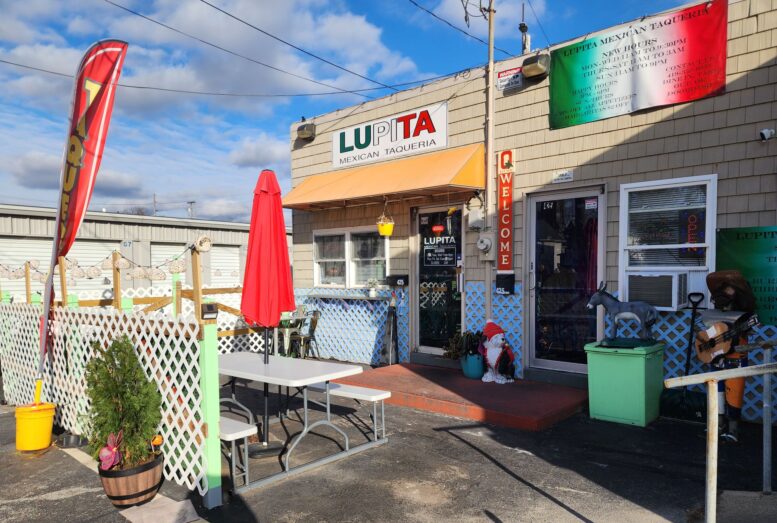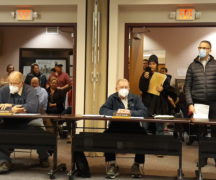By JAN McLAUGHLIN
BG Independent News
The food service license has been yanked for a Bowling Green restaurant.
Due to repeated critical violations, the Wood County Board of Health voted Thursday evening to revoke the license for Lupita Mexican Taqueria at 425 E. Wooster St.
Rescinding a food service license is a rare action by the health department, with fewer than one occurring each year, according to Lana Glore, environmental health director at the health department.
The goal of the department is always to get a restaurant to comply with requirements, Glore said. Before a license can be pulled, businesses are given several opportunities to fix violations and are offered training to improve conditions.
“We bring them in and discuss, and try to get them on the path to compliance,” Glore said.
Food service operations also have the right to request a hearing prior to a license being revoked. In this case, the owners of Lupita did not ask for a hearing, Glore said.
If the operators of Lupita want to seek a new food license, their first opportunity to do so will be March 1, 2025.
This revocation is due to recurring violations, both critical and non-critical.
Critical Violations
Violations of the food regulations, which, if left uncorrected, are more likely than other violations to directly contribute to food contamination or illness. Examples include improper temperature control of food and the improper cooking, cooling, refrigeration, or reheating of food. Such problems can create environments that cause pathogens (bacteria/viruses) to grow and thrive, which put consumers at risk for food-borne illness.
Non-Critical Violations
Violations not directly related to the cause of foodborne illness, however, if uncorrected, could affect the operation of the facility and lead to critical violations. Examples include a lack of facility cleanliness and maintenance or improper cleaning of nonfood-contact equipment.
Because of recurring problems at Lupita, sanitarians from the health department returned each month this year for inspections.
In January, the health inspector noted seven critical violations at Lupita:
- The handwashing sink was not accessible. Both hand sinks were blocked with a stool and sanitizer bucket stored inside.
- Food was in contact with an unclean surface or linens.
- Food was not properly protected from contamination by separation, packaging, and segregation. Raw shell eggs were stored above lettuce. All food must be stored in the proper storage order to prevent cross contamination. Raw items must be stored below ready to eat items.
- Equipment food-contact surfaces or utensils were unclean. The inspector observed build up on the blender.
- Improper reheating of food that requires temperature control for safety. The inspector observed rice in the hot holding unit reheated and holding at 98 degrees. All food that was cooled must be reheated over a direct heat source to 165 degrees before storing in hot holding at 135 degrees to prevent bacteria growth that can cause a foodborne illness.
- Refrigerated, ready-to-eat, temperature controlled foods were not properly date marked. The inspector noted there was no date marking in the entire facility. All temperature controlled ready to eat food products must be date marked to prevent bacteria growth that can cause a foodborne illness.
- The manual wash station was not being maintained at 110 degrees or above. The three compartment sink was not set up properly. All items must be first scraped and pre-rinsed, then go through three bays for a wash solution, rinse water, and then sanitizer.
Three inspections were conducted at Lupita in June, with a total of 12 critical violations reported. Those included several repeated problems:
- Person in charge was unable to demonstrate knowledge of temperatures and times for safe refrigerated food storage, hot holding, cooling and reheating.
- The food was not properly protected from contamination by separation, packaging, and segregation.
- Hot foods were not held at proper temperature of 135 degrees or above.
- Cold foods were not held at proper temperature of 41 degrees or below.
- Food employees were not washing hands in approved handwashing sink or automatic handwashing facility. Food employee washed hands in the three bay sink. All hand washing must be done in the dedicated hand washing sink.
The inspector also noted in June that the business had added a new meat slicer which did not appear to be commercially tested for sanitization.
In October, the inspector reported that cold foods were not being held at proper temperatures. It was also noted that the facility was continuing to violate the pre-administrative hearing agreement by not cleaning the site, not repairing the facility, and not removing unapproved equipment.
Health department sanitarians make return visits to establishments that have critical violations.
For restaurants that continue to have ongoing problems, the sanitarians train designated employees to correct ongoing violations, such as workers not washing their hands before handling meat. With the high turnover rate in food service, that training is done frequently, Glore said.
If there is an “immediate health risk” to the public, the health commissioner can take action.
“Nothing can remain a public health risk,” Glore said.
The health department can deny, suspend or revoke a food service license based on the history and seriousness of violations. However, the process takes a series of administrative hearings.
Inspection frequency is based on the risk level classification determined by the types of food preparation that take place, including reheating and hot holding.
Facility inspections are conducted one to four times per year, depending on the complexity of a facility’s menu and their potential risk of a foodborne illness. Inspection reports are available for viewing throughout the year as inspections are conducted at https://www.healthspace.com/Clients/Ohio/WoodCounty/WoodCounty_Web_Live.nsf/food-frameset.
The inspection risk levels range from 1 to 4. The lowest Level 1 involves pre-packaged foods. In those establishments, the sanitarian checks on labeling of food items, source of the food, storage temperatures and expiration dates.
The most extensive inspections occur for those establishments at Level 4, where foods go through several preparation steps, involving food originating from animals, where temperature control is needed to preclude bacterial growth, or where freezing is used as a means of parasite destruction.
The health department licenses and inspects restaurants, grocery stores, certain vending machines, and food stands at festivals and fairs. The food safety program is primarily responsible for protecting the community against foodborne illnesses resulting from health code violations and improper handling of food.
Several types of inspections may be conducted by the health department sanitarians:
- Standard: This inspection is unannounced to the facility. A local health department sanitarian will conduct a complete inspection covering all items in the regulations for compliance.
- 30-day inspection: This is a standard inspection that must be conducted no more than 30 days after a license is issued to a new food service operation or retail food establishment.
- Pre-license inspection: This inspection is not required, but may be conducted by the local health department prior to issuing a license to a new food service operation or retail food establishment. The purpose of this inspection is to provide consultation and education to the operator.
- Critical control point (CCP): This inspection may be scheduled or unannounced. A sanitarian will spend time reviewing a facility’s food processes that may directly contribute to food contamination or illness, and will educate the facility on proper procedures.
- Process review (PR): This inspection may be scheduled or unannounced. This type of inspection is similar to a CCP inspection; however the inspections are conducted in facilities such as grocery stores or convenience stores. The inspection will focus on a specific process that may directly contribute to food contamination or illness.
- Follow-up inspection: This is an inspection for the specific purpose of re-inspecting items that were not in compliance at the time of the standard, CCP and/or PR inspection. These inspections are scheduled.
- Complaint: This is an unannounced inspection conducted as a result of a complaint received by a local health department. The specifics of the complaint will be evaluated and discussed with the person in charge of the facility.
Anyone seeing an unsafe practice in a licensed restaurant, store or food booth, should call the Wood County Health Department at 419-354-2702. You do not need to give your name. An environmental health specialist will follow up with an inspection.





